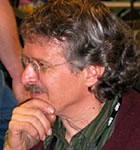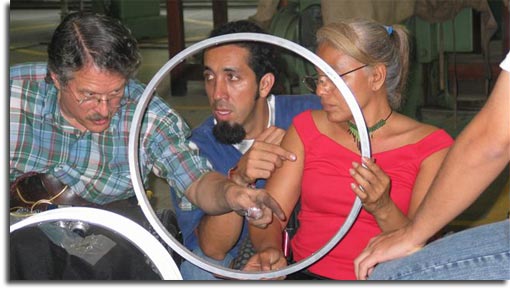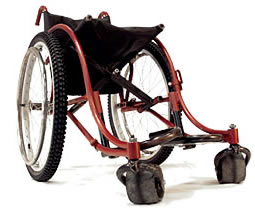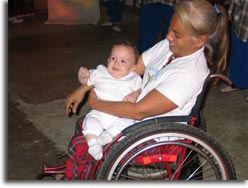“Security is mostly a superstition. It does not exist in nature, nor do the children of men as a whole experience it. Avoiding danger is no safer in the long run than outright exposure. Life is either a daring adventure, or nothing. To keep our faces toward change and behave like free spirits in the presence of fate is strength undefeatable.”
- Helen Keller, 1880-1968
 |
| Ralf Hotchkiss (courtesy of Whirlwind Wheelchair International) |
Ralf Hotchkiss is an engineer, inventor, teacher, humanitarian, activist, and founder of Whirlwind Wheelchair International (WWI). He is also a wheelchair rider himself.
Ralf grew up tinkering with and building devices to aid people with disabilities. Because he knew a number of blind people, Ralf was first inspired to create remedies for their disability. In high school he won the Westing House Science Talent Search award for his design of an electronic gadget to help blind people “see.” Although his invention impressed the judges, Ralf’s blind friends felt that his hi-tech inventions, while innovative, didn’t solve their mobility challenges. For them there wasn’t much that was better than a dog or a cane. In order to help his friends and others, he would have to learn and observe their needs firsthand to know how he could help. “An (inventor) who doesn’t get down on the same level (as the people for which his is designing) is not likely to be very successful,” Ralf said in an interview with My Hero.
 |
| (courtesy of Whirlwind Wheelchair International) |
At 18 years of age, Ralf lost the use of his legs in a motorcycle accident. Instead of wallowing in self pity, Ralf immediately turned his tragic predicament into a positive benefit. In fact, Ralf never viewed his accident as a negative; to him it gave him the opportunity and experience he had been searching for. “I wouldn’t have done this well or had as much ability to come up with solutions that worked,” Ralf shared with us.
Ralf’s solutions really have worked—for people all around the world. He has turned the standard-issue clunky and unwieldy wheelchair into a sleek, practical solution that fits the wheelchair rider and his environment. His work with long-time consumer advocate and lobbyist Ralph Nader taught him that you have to step in and roll up your sleeves to make change—and you have to be persistent and innovative. Along with cowriting a book with Nader and working as one of the original Nader’s Raiders, Ralf teamed up with his mentor to help wheelchair riders in the United States have access to better chairs at lower prices. Ralf’s tinkering and advocacy would soon become a crusade for wheelchair riders around the world, opening up doors and offering mobility options that expand lives.
 |
| (courtesy of Whirlwind Wheelchair International) |
While on a trip to Nicaragua in the late 1970’s, Ralf met three young men sharing a wheelchair. At first he felt a pang of sympathy for the poor teens who could not afford to have wheelchairs of their own, but when they approached Ralf to help him fix his high-tech wheelchair, battered from the rugged terrain, he realized that they knew more about wheelchair design than most of the people in the US. They were the ones who could share their experience to improves the lives of many people in developing countries.
During the next two decades, Ralf worked with supporters to teach wheelchair riders how to build and maintain wheelchairs, eventually founding Whirlwind Wheelchair International (WWI). WWI provides riders in countries like Kenya, Armenia, Guatemala, and dozens of others with the appropriate transportation for their country, lifestyle, and terrain. While the designs are state-of-the art, all parts are locally made and assembled within the country to keep costs down and maintenance easy.
 |
| (courtesy of Whirlwind Wheelchair International) |
Instead of being left behind, unable to work or go to school, wheelchair riders are now able to keep up with the other members of their villages. Hotchkiss and the other partners at WWI are working to bring self-sufficiency and national pride to the most poverty-stricken countries, as they fulfill a basic need for mobility. While Hotchkiss can add awards and honors such as the MacArthur Foundation Award, the Chrysler Design Award, and the Sprit of DaVinci Award, and lists of others, the true count of his success is in the 50,000 wheelchair riders he’s helped since the program started in 1989.
Page created on 8/4/2014 11:15:57 AM
Last edited 1/7/2020 5:14:32 PM
Read what Ralph Nader has to say about Ralf Hotchkiss in this letter. (courtesy of CommonDreams.org
Ralf Hotchkiss & His Whirlwind Wheelchairs
by Ralph Nader
Published on Friday, December 24, 2004 by CommonDreams.org
Nearly forty years ago, a young high school motorcycle rider in Rockford, Illinois went over a grate, flipped over into the air and landed with a broken body. He became paraplegic. Because of the remarkable way Ralf Hotchkiss responded to his disability, thousands of people with disabilities here and in developing countries are now riding in durable, affordable wheelchairs.
He entered Oberlin College and graduated with an engineering degree. After interning with one of our groups as an undergraduate, he started the Center for Concerned Engineering where he began taking on a British corporation which monopolized wheelchair production and charged unaffordable prices for an inferior product. Hotchkiss began inventing improvements using inexpensive materials and then making them available publicly. He took no patents out on his inventions.
Not content with both helping start competitors to this British monopoly and perfecting wheelchair engineering design, Hotchkiss widened his area of advocacy to help make possible the great breakthroughs in access to buildings, airplanes, buses and trains for physically disabled people. You can witness the results everyday where wheelchair riders (as he prefers to call them) can participate in so many occupations, community and athletic activities formerly denied them.
Handing out wheelchairs to people-the charity model-did not appeal to this determined, problem-solving young man. First, the wheelchairs were not that good. Wheelchairs currently being imported from China are designed for hospital floors, not outdoors where paths and terrain are quite uneven. Such chairs can be dangerous to their occupants by breaking and tipping over riders. And, it is often difficult to obtain spare parts.
Hotchkiss started Whirwind Wheelchair International (WWI) to teach people in South America, Africa and Asia how to manufacture their own wheelchairs in small shop facilities.
The need is vast and growing. As WWI says: "Mobility is as basic as food and shelter, but 98% of the 20 million people who need wheelchairs in third world countries don't yet have one." Western models are prohibitively expensive. Locally produced designs can be not only much cheaper, more rugged and more drawing on locally available materials that simplify repairs, but they also elicit the pride and care that goes along with locally producing what you own.
Many of these shops are owned and operated by women with disabilities. More and more of the inventive ideas to improve a wheelchair's responses to the stresses, pressures and bumps are coming from riders and mechanics. One such invention was the Zimbabwe front caster wheel. It was adapted from a pushcart that was observed in Harare, Zimbabwe and is now used for negotiating rugged paths.
Based at San Francisco State University's School of Engineering, with key participation of Professor Peter Pfaelzer, Whirlwind Wheelchair International brims with new ideas. Hotchkiss is driven by a technical and moral imagination. He says, "Imagine not being able to go where you want, when you want. Imagine being stranded the last place someone set you down. Imagine the waiting, the frustration, the loneliness. Imagine it is lifelong." He aims to break what he calls "the imprisonment of immobility" by expanding his coalition to be beyond the nearly 50 workshops in 25 countries from Nicaragua to Uganda to Afghanistan.
Current initiatives include a new toddler's wheelchair for children one to six, built low enough to the ground to allow interactions with other small children. His valiant crew is pioneering new distribution and marketing strategies to get "wheeled mobility into the lives of people with fewer resources." Jobs are produced for people with disabilities along with greatly enhanced mobility.
Next year Hotchkiss will travel, in his easy riding wheelchair, to Columbia, Uganda, Eritrea, Vietnam and Thailand to launch or expand these production workshops. His energy is irrepressible; all obstacles and difficult circumstances, regarding his life's mission, are only problems to be methodically analyzed and dealt solutions.
Now, wouldn't you think his Center would be besieged with public and private donors? If you did you would be rational. But Hotchkiss's group is achieving every day. Foundations too often favor long-winded studies about what needs to be achieved like the endless large grants for groups to produce the redundant report on energy policies or ways of learning in schools. His group's non-profit budget, which was around $400,000 three years ago, is now down by half, to about $200,000!
The more he produces with fewer resources, the fewer resources he can raise. He is now down to four staff, including himself, to help turn around, with his sustainable and multiple trim tabs, the lives of 20 million people.
The U.S. government, which plows tens of billions of dollars into unneeded weapons systems from the wasteful Lockheed-Martin et al, which blows tens of millions of dollars regularly on foreign aid and consultants' projects which do not work, can't seem to lend Whirlwind Wheelchair International a hand. Imagine the goodwill for America's best instincts that some modest assistance will facilitate.
Hotchkiss has received the prestigious MacArthur "genius" fellowship and been given many engineering design and other major awards. It isn't as if he has trouble filling out a one page vitae. It is just our society's messed up, cruel priorities that prevent making possible thousands of more locally produced wheelchairs of rugged, affordable design, from rolling into their grateful riders' arms.
If you want to help or suggest sources of help, call Ralf Hotchkiss at (415) 338-1290, e-mail him at [email protected] or log into his website at whirlwindwheelchair.org. Contributions are deductible.
